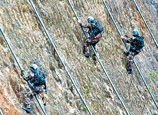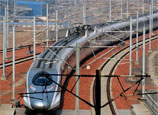
BEIJING, Dec. 26 (Xinhua) -- Chinese lawmakers on Wednesday suggested more efforts were needed on improving and protecting the quality of the country's arable land.
Members of the Standing Committee of National People's Congress made the suggestion at a panel discussion on a State Council report about land administration, which was submitted to the top legislature for deliberation.
Lu Yongxiang, vice chairman of the NPC Standing Committee, suggested the government invest more money to upgrade medium or lower-yield farmland, which accounts for about 70 percent of the country's arable land.
Efforts should be made to improve soil and irrigation and restore polluted soil in order to boost both agricultural production and ecological benefits, he said.
China applies the principle of "reclaiming the same area of land as is used."
Users shall be responsible for reclaiming the same area and quality of cultivated land they use for construction of non-agricultural projects, the Land Administration Law stipulates.
Wang Yunkun, an NPC Standing Committee member, voiced his doubts on the quality of compensated land and suggested the NPC and relevant departments of the State Council, or Cabinet, conduct comprehensive checks nationwide.
"Farmland is not easy to cultivate. It usually takes dozens or hundreds of years," he said.
Hou Jianguo, an NPC Standing Committee member said, "People should realize that high-yield farmland is a precious resource that is nonrenewable."
Hou urged the government to strictly implement the principle of "reclaiming the same area of land as is used."
He added, "Some special protection zones should be set up to better protect high-yield arable land."
China's per capita arable land is only about 1.35 mu, lower than half of the world average. High-yield farmland only accounts for 30 percent of the total arable land and the country has little backup resources available, according to the report.
To ensure grain security, the country has drawn a "red line" of 1.8 billion mu (120 million hectares) as the official minimum of arable land to feed the world's largest population.
However, with rapid urbanization and massive infrastructure construction, the country is already edging dangerously close to the tipping point, with just 1.82 billion mu available as of 2011, figures from the report showed.














 Ministry urges school safety after fatal van crash
Ministry urges school safety after fatal van crash


![]()
